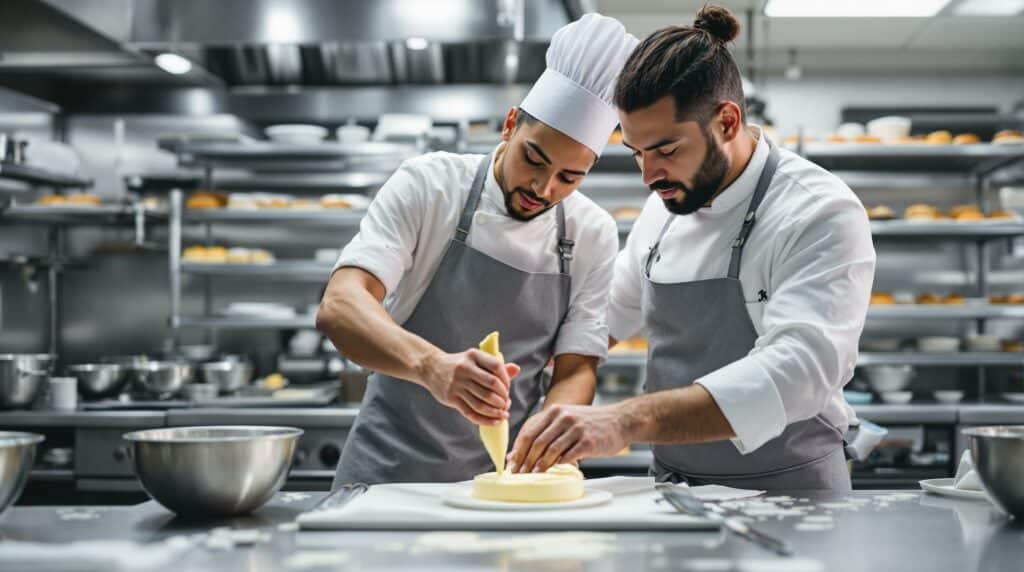You’re passionate about baking, eager to learn from professionals, and ready to get your foot in the door of a real kitchen or bakery. But perhaps you lack extensive paid experience, or you want to test the waters in a specific type of establishment before committing long-term. In the culinary world, particularly in high-caliber kitchens and bakeries, a common pathway for gaining this crucial exposure is through a “stage” (pronounced “staahj”) or internship.
Staging, a term derived from the French word stagiaire meaning trainee or intern, typically involves a short-term, often unpaid, work experience focused on learning. Internships might be more structured, longer, sometimes paid, or linked to a culinary school program. Regardless of the exact title, these opportunities are invaluable for aspiring bakers. However, simply showing up isn’t enough. To truly benefit from a stage or internship – to maximize learning, make crucial connections, and potentially turn it into a job offer – requires preparation, the right attitude, and strategic effort. Let’s explore some “Staging Smarts” to help you make the absolute most of these experiences.
What is Staging / Interning in a Bakery?
Before diving in, let’s clarify the concept:
- Definition: A stage or internship is a temporary work placement within a professional food establishment (bakery, restaurant pastry department, hotel kitchen, etc.). The primary focus is usually on learning and observation, though it almost always involves assisting with tasks.
- Duration: Can range from a single day (a “trail” or working interview) to a few days, weeks, or even several months for formal internships.
- Compensation: Traditional stages are often unpaid, viewed as an exchange of labor for experience and education. Formal internships, especially those linked to schools or longer commitments, may offer a small stipend or hourly wage, but this varies greatly. Be clear about expectations beforehand.
- Purpose (For You, the Intern/Stagiaire):
- Gain invaluable real-world experience in a professional setting.
- Learn specific techniques and workflows directly from experienced professionals.
- Observe the pace, pressure, and standards of a working kitchen.
- Network with chefs, bakers, and potential future colleagues.
- “Audition” – demonstrate your skills, work ethic, and attitude for potential future employment at that establishment or for references.
- Add tangible, relevant experience to your resume.
- Purpose (For the Establishment):
- Assess potential hires in a low-risk way.
- Get assistance with basic prep and cleaning tasks.
- Fulfill educational partnerships (for formal internships).
- Contribute to industry training and share knowledge (in well-run programs).
Finding Your Stage: Securing Opportunities
Landing a good stage or internship often requires a proactive approach:
- Target Wisely: Don’t just apply everywhere. Identify specific bakeries, pastry shops, or restaurants whose work genuinely inspires you and aligns with the skills you want to learn. Research their style, their chef/baker, and their reputation. Are they known for excellent sourdough, intricate pastries, or beautiful cakes?
- Craft a Professional Inquiry: Reach out professionally.
- Email: This is often the preferred method. Write a concise, polite, and personalized email. Address it to the Head Baker or Pastry Chef by name if possible (check their website or call to ask for the correct contact). Express your genuine admiration for their work (mention something specific if you can!), clearly state your desire to stage/intern to learn from their team, specify your availability (dates, duration, hours per week), and briefly highlight any relevant skills or your strong eagerness to learn. Attach your resume.
- Phone/In-Person: A polite phone call during a non-busy time (mid-afternoon is often best) to simply inquire if they accept stages and who to contact can be effective. Dropping off a resume in person requires careful judgment – only do it at smaller establishments during very slow periods, be brief, polite, and prepared to leave quickly.
- Leverage Your Network: Talk to culinary school instructors, career services, former classmates, or anyone you know in the food industry. A personal introduction or recommendation can make a significant difference.
- Be Clear and Flexible: State what you hope to learn, but also express flexibility in terms of tasks you’re willing to perform (expect lots of prep and cleaning!). Be clear about your availability and understand that many valuable stage opportunities are unpaid.
- Follow Up Politely: If you don’t hear back within a week or two, a single polite follow-up email is acceptable. Remember, chefs and bakers are incredibly busy people. Persistence is good, but pestering is not.
Preparation is Key: Before Your First Day
You’ve secured a stage – congratulations! Now, prepare to make a great impression:
- Confirm All Details: Double-check the start date, exact start time (plan to arrive early!), address, expected duration, any specific dress code requirements (non-slip, closed-toe shoes are ALWAYS mandatory; they might specify pants color or provide an apron/jacket), and whether you need to bring your own basic tools (often a small knife set, peeler, thermometer).
- Research Recap: Briefly review the establishment’s menu, website, social media, and the chef’s background one last time.
- Set Learning Goals: Mentally outline 2-3 specific things you hope to observe or learn during your time there. This helps you stay focused.
- Mentally Prepare & Rest: Understand that you’ll likely be doing basic, sometimes repetitive tasks, especially at first. Go in with an open mind, zero ego, and a primary focus on learning and contributing positively. Get plenty of sleep the night before!
Making the Most of It: Excelling During Your Stage/Internship
Your time in the kitchen is valuable. Maximize it by focusing on these key areas:
- Be Punctual & Prepared: Arrive 10-15 minutes before your scheduled start time, ready to work. Have your tools (if required), uniform, and a small notebook/pen ready.
- Observe Intently: Pay close attention to everything happening around you. How is the kitchen organized? What’s the workflow? How does the team communicate? How are specific techniques executed? Watch the details – speed, efficiency, cleanliness standards.
- Listen Carefully & Follow Instructions Exactly: This is paramount. When given a task, listen to the entire instruction. If anything is unclear, ask polite, clarifying questions immediately. Do the task precisely as instructed, even if it’s different from how you learned it elsewhere. Their kitchen, their rules. Don’t assume anything.
- Work Clean, Stay Organized: Constantly maintain a clean and tidy workspace. Wipe up spills immediately. Clean tools as you go. Put things back where they belong. Ask where cleaning supplies are kept. Demonstrate impeccable sanitation and organization – chefs notice and value this immensely.
- Ask Thoughtful Questions (at the Right Time): Show your engagement and desire to learn by asking relevant questions. “Chef, I noticed you add the butter at this stage for the brioche, could you explain why?” is much better than interrupting during a rush. Wait for a lull in service or production, or politely ask your direct supervisor when would be a good time to ask a couple of questions. Avoid asking things you could easily find out yourself or questions that have already been answered.
- Show Initiative (Be Proactive, Not Annoying): When you finish an assigned task, don’t just stand around waiting. Look for something that needs doing – does a station need wiping? Ingredients need restocking? Dishes piling up? Politely ask, “Chef, I’ve finished [task], what can I help with next?” or “Chef, would it be helpful if I [offer a specific task, like peeling carrots or sweeping]?”. Be helpful without getting in the way or overstepping.
- Maintain a Positive “Can-Do” Attitude: Enthusiasm, eagerness, and a willingness to learn go a long way. Tackle every task, even the most mundane “grunt work” (scaling, peeling, cleaning floors), with diligence and a positive attitude. Avoid complaining, negativity, or kitchen gossip. Be respectful to everyone on the team, regardless of their position.
- Work with Urgency (Sense of Purpose): Move efficiently and with purpose. There’s a difference between working quickly and working frantically/carelessly. Find a steady, focused pace.
- Be a Sponge: Absorb as much information as possible, both through direct instruction and observation. Take mental notes (or brief written notes during downtime if appropriate and permitted).
- Respect the Hierarchy: Understand who your direct supervisor is for tasks and questions. Follow the established chain of command.
After the Stage: Follow-Up and Reflection
Your efforts shouldn’t end when you walk out the door.
- Express Gratitude: Promptly (within 24-48 hours) send a personalized thank-you note or email to the Head Chef/Baker and perhaps anyone else who directly mentored you. Thank them specifically for the opportunity, mention something concrete you learned or enjoyed observing, and reiterate your interest if you are seeking employment.
- Reflect on the Experience: Take time to process what you learned. What techniques did you see? What surprised you about the workflow or environment? Did you enjoy the type of work? Did it clarify or change your career goals? What skills do you need to develop further?
- Update Your Resume: Add the stage/internship to your experience section, listing the establishment, duration, and key tasks performed or skills observed/learned.
- Stay Connected (Professionally): If the experience was positive and you felt a good connection, consider connecting with the chef or key staff on LinkedIn (if appropriate). A polite check-in email occasionally down the line (e.g., congratulating them on an award or mentioning you tried a technique you learned there) can keep the connection alive for future opportunities, but don’t overdo it.
Conclusion: Staging Your Success
Stages and internships are far more than just unpaid labor or resume padding; they are invaluable stepping stones in a culinary or baking career. They offer unparalleled opportunities to gain practical experience, witness real-world operations, learn directly from professionals, build crucial industry connections, and demonstrate your potential to future employers. Success hinges not just on your existing skills, but heavily on your attitude, work ethic, cleanliness, eagerness to learn, and professionalism.
Approach every stage, paid or unpaid, short or long, with “staging smarts.” Be prepared, observant, proactive, respectful, and relentlessly focused on learning and contributing positively. By making the absolute most of these experiences, you transform them from simple work trials into powerful catalysts for skill development, networking, and launching a successful and rewarding career in the demanding world of professional baking.







